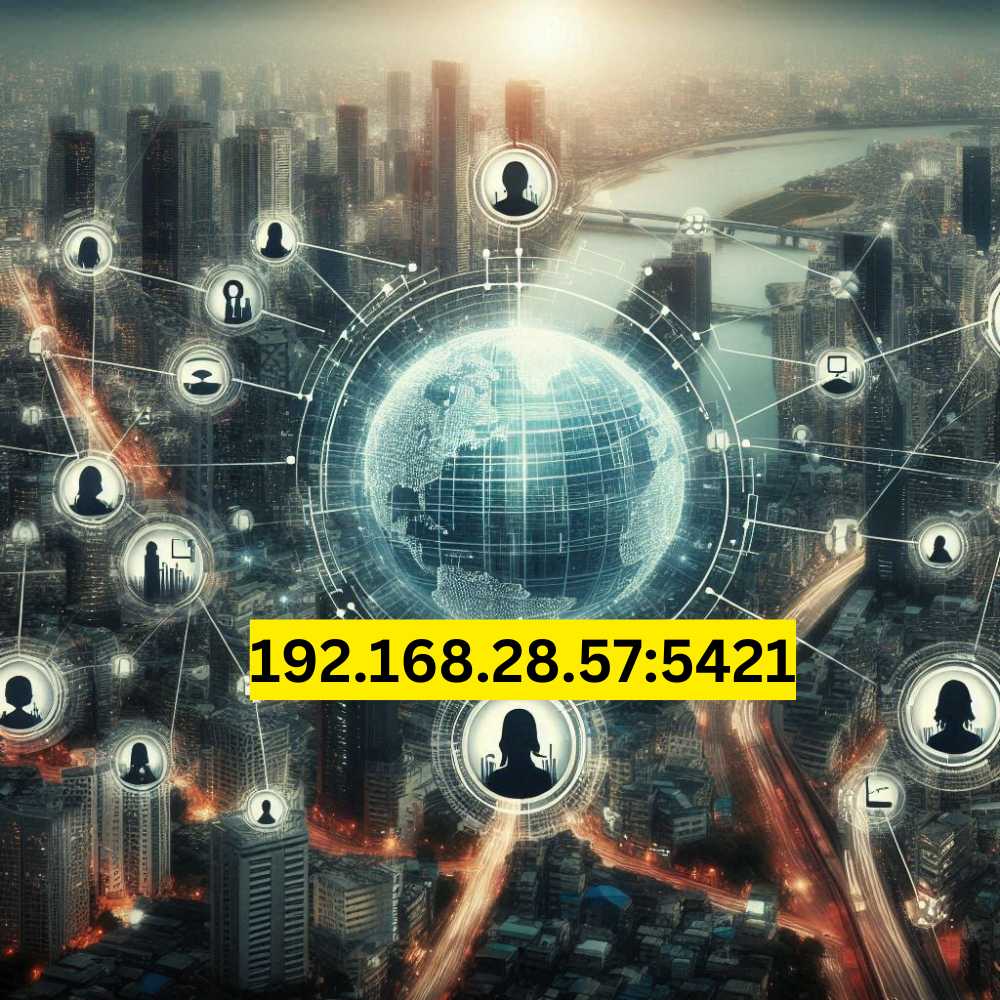Introduction to IP Addresses and 192.168.28.57
In the vast and intricate world of networking, each IP address plays a crucial role in connecting devices and facilitating communication. Among these addresses, you might come across 192.168.28.57, a seemingly ordinary string of numbers that holds significant importance in local networks. But what does it mean? How does it function within the larger framework of networked systems?
As we delve deeper into this specific IP address and its associated port number, 5421, you’ll discover its applications, security considerations, and troubleshooting tips that can enhance your networking experience. Whether you’re a tech enthusiast or someone just starting to explore the realm of networks, understanding 192.168.28.57:5421 could be your gateway to mastering connectivity in today’s digital age!
Understanding the Components of 192.168.28.57:5421
The IP address 192.168.28.57:5421 consists of two main components: the IP address and the port number.
The first part, 192.168.28.57, is an IPv4 address typically used in local networks. This range frequently appears in home routers and private networks, allowing devices to communicate internally without exposure to the internet.
Next comes the port number, 5421, which specifies a particular service or application on that device. It serves as a gateway for data packets destined for specific applications running on servers or computers within that network.
Together, these elements enable seamless communication between different devices and services over a network while keeping them organized and efficient in their functions.
The combination also ensures security by directing traffic only where it needs to go based on defined rules set up by system administrators.
Common Uses for 192.168.28.57:5421 in Networking
The IP address 192.168.28.57:5421 serves various purposes in networking, often as part of a private network setup.
Many home and small business routers utilize this address for local communications between devices. It’s common to see it assigned to printers or file servers, allowing multiple users easy access.
Another frequent application involves CCTV systems. Cameras on the same network can stream feeds through this specific port, enabling monitoring from different locations without compromising security.
In gaming setups, 192.168.28.57:5421 might host game servers for multiplayer experiences within a closed environment, providing low-latency connections that enhance gameplay.
VoIP applications also benefit by using this IP address for call management services within localized networks, ensuring clear communication channels among users without external interference.
Security Considerations with 192.168.28.57:5421
When working with 192.168.28.57:5421, security should be a top priority. This IP address is part of the private network space, making it crucial to implement strong defenses.
Using a firewall can help limit access to this port and reduce exposure to potential threats. Ensure that only specific devices are allowed to communicate through it, minimizing vulnerabilities.
It’s also important to regularly update software associated with this IP address. Outdated programs can harbor security flaws that hackers exploit.
Employing encryption for data transmitted over 192.168.28.57:5421 adds another layer of protection against interception or eavesdropping.
Monitoring traffic on this port will provide insights into unusual activity, helping you respond quickly if any anomalies arise in your network environment.
Troubleshooting and Diagnosing Issues with 192.168.28.57:5421
When issues arise with 192.168.28.57:5421, the first step is to check your connection. Ensure that your device is properly connected to the network and that you’re using the correct IP address.
Next, try pinging the IP address from a command prompt or terminal window. This can help identify if there’s any communication between devices on your network.
If you still encounter problems, verify any firewall settings that may block access to this specific port number—5421 could be restricted by default configurations.
Another useful method involves reviewing logs for error messages or unusual activity related to 192.168.28.57:5421. These details can provide critical insights into what might be malfunctioning in your setup.
Consider restarting both the router and affected devices; sometimes a simple reboot resolves connectivity glitches efficiently.
Conclusion and Future Developments of
The landscape of networking is constantly evolving. As we look ahead, the significance of IP addresses like 192.168.28.57:5421 will likely grow.
Emerging technologies such as IoT and smart devices are increasing demand for efficient network management solutions. This opens doors for innovations surrounding local IP addresses.
Advancements in security protocols are also on the horizon. Enhanced measures could help protect sensitive data associated with addresses like 192.168.28.57:5421 against potential threats.
As networks become more complex, user-friendly interfaces for monitoring and troubleshooting will be essential tools for administrators.
Staying informed about these developments can empower users to leverage their networking capabilities better than ever before, ensuring robust performance and security in an increasingly connected world.
FAQs
How do I reset my 192.168.10.1 password?
To reset your 192.168.10.1 password, locate the reset button on your router, which is often a small, recessed button. Using a pointed object like a paperclip, press and hold the button for about 10-15 seconds. This will restore the router to its factory settings. After resetting, you can log in with the default credentials provided by the manufacturer and configure your new password.
How to connect Wi-Fi with IP address and password?
To connect to a Wi-Fi network using an IP address and password, first ensure your device’s Wi-Fi is turned on. Open the network settings on your device, locate your Wi-Fi network, and select it. Enter the Wi-Fi password when prompted. If manual IP address configuration is needed, go to the network settings, select advanced or manual settings, input the IP address, gateway, and subnet mask, then save and connect.
How does an IP address work?
An IP address is a numerical label assigned to each device connected to a computer network that uses the Internet Protocol for communication. It serves two main functions: identifying the host or network interface and providing the location of the host in the network. This enables devices to locate and communicate with each other, ensuring data packets are sent and received accurately.
What does your IP address show?
Your IP address can reveal many details about your internet activity. It can show your general geographic location, such as your city and country. It may also indicate the Internet Service Provider (ISP) you use. While it doesn’t disclose personal information directly, it serves as a digital identifier connecting your online actions to your device.
What is the significance of 192.168.28.57:5421 in networking?
The IP address 192.168.28.57:5421 plays a crucial role in local networks, particularly for devices that require a specific port to communicate effectively. This combination allows for directed traffic, ensuring data reaches its intended destination smoothly.
Common Questions about 192.168.28.57:5421
Can I access 192.168.28.57:5421 from outside my network?
Typically, you cannot access this address from outside your local network due to security measures implemented by routers and firewalls designed to protect internal resources.
How can I troubleshoot issues with 192.168.28.57:5421?
Begin by checking device connectivity within the same network segment; ensure that the device using this IP is powered on and properly connected to the router or switch.
Are there any risks associated with using 192.168 addresses like 192.168.28.57?
Using private IP addresses such as those starting with “192.” minimizes exposure to external threats but still requires proper configuration and security practices within your local network environment.
Is it possible for two devices on the same network to have the same IP address?
No, each device must have a unique IP address within its subnet range, including when utilizing addresses like 192.168.x.x formats.
This understanding of how addressing works can empower users and administrators alike in managing their networking needs efficiently while considering security implications moving forward.


